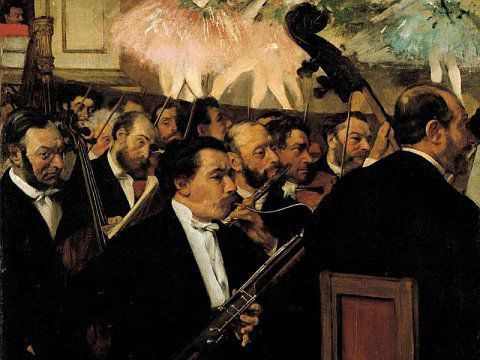Strike over, the Chicago Symphony Winds put the focus back on the music
When planning this season well over a year ago, the University of Chicago Presents series likely had no idea that a concert by the Chicago Symphony Winds would have any news value beyond the music itself.
But coming less than 24 hours after the CSO’s seven-week was settled—the longest and most contentious in the orchestra’s history—Sunday afternoon’s event had some undeniable extra interest.
There is little doubt that some negative feelings will remain in the wake of the strike, not least from CSO donors and subscribers. Time will tell as to whether the strike will have an effect on the orchestra’s attendance and private financial gifting.
If the Mandel Hall audience was somewhat lighter than usual and the initial applause on the polite side, the CSO Winds’ superb performances of a trio of works for large wind ensemble earned an enthusiastic ovation by the concert’s end—nicely shifting the emphasis from salaries and pension plans back to the music where it belongs.
The concert began with Richard Strauss’s Serenade, Op. 7. This brief sonata movement for 13 winds shows the 17-year-old composer already handling large forces with striking ease and confidence. The Chicago Symphony Winds—plus one non-CSO clarinet ringer— gave a worthy performance with fine solo efforts, though the lack of blended textures indicated the opener got the short end of rehearsal time.
Charles Gounod remains most renown for his operas Faust and Romeo et Juliette. Yet though opera and vocal music make up the bulk of his oeuvre, the French composer wrote some inspired chamber works, including three excellent (and grievously neglected) string quartets and the Petite Symphonie for winds.
There are few works better suited to a Sunday matinee program than the Petite Symphonie. Scored for nine winds, this engaging score shows Gounod’s melodic vein at its most relaxed and gracious.
With all the CSO wind principals except clarinetist Stephen Williamson aboard, the players’ put across the lyrical qualities of the music delightfully. The perky Allegretto of the opening movement received nimble playing, and Stefán Ragnar Höskuldsson’s graceful flute solos brought out the piquant charm of the Andante.
The arresting hunt-like flavor of the Scherzo’s main theme was aptly swaggering, contrasted with the pastoral exchanges of oboist William Welter and clarinetist John Bruce Yeh in the bucolic middle section. The finale went with ample spirit without sacrificing an essential Gallic flavor. Nearing the end of his first season as principal oboe, Welter has quickly become a terrific ensemble player, blending ideally with his wind colleagues, and throwing off personality-plus solos with Höskuldsson in the rollicking finale.
Dvořák’s Serenade for Winds closed the short program (53 minutes of music). In this colorful work—scored for nine winds plus cello and bass—one would have liked a bit more dynamic contrast and expressive nuance, with a hearty forte tending to predominate.
Still, such was the polish and lively commitment of the playing that it was hard to quibble. The jaunty, slightly malign opening march opened in arresting fashion, with the turn into a more rustic Bohemeian vein smoothly handled. Daniel Gingrich contributed nicely understated horn work to the ensuing Minuetto, with the antic quality of the breakout section in the middle again providing essential contrast.
Welter was primus inter pares in the introspective Andante with lovely playing, both solo and in his conversational duetting with Yeh’s clarinet, and the shifting episodes were fluently assayed by all.
The final movement was off at a crackling pace with sharp rhythmic snap. Spiced by Yeh’s woodsy clarinet work, the ensemble playing was inspired, with the return of the opening march having a cumulative inevitability.
Posted in Performances



